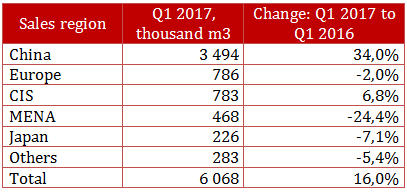In March 2017, Russian softwood lumber exports reached its historic peak of 2.5 million m3 (+11% yoy)
In the first quarter of 2017, high demand for softwood lumber was registered in the global markets. Russian export sales grew 16% on-year to reach 6.1 million m3, worth $761 million (+26% yoy).
Softwood lumber exports from Russia in March 2017 amounted to 2.5 million m3 (+32% on February 2017, +11% on-year), worth $313 million (+22% yoy, +31% on February 2017).
Table 1. Russian softwood lumber sales in the first quarter of 2017
Source: WhatWood Monthly Lumber Report
The most dynamic growth is registered to China. Despite the high base effect, sales to China in the last two years are growing about 4% every month. This is very positive dynamics, and the peak is still not seen. Chinese processing enterprises have reoriented production for Russian timber and widen the scope of its application, which makes them willing to buy lumber in any volumes.
Positive global news, which appear since Q2 2016, are contributing to the ameliorating perspective in the global markets. Against this background, International Monetary Fund has revised its market growth outlook in 2017 from 3.4% to 3.5%. The outlook for 2018 still remains the same: +3.6%.
Along with that, the U.S. government decision to impose duties on Canadian lumber imports in April 2017, ranging from 3% to 24% for five major companies (West Fraser Mills, Tolko Marketing and Sales, J.D. Irving, Canfor Corporation, and Resolute FP Canada) and 20% for all the other Canadian producers may influence significantly the global trade balance. Canada is the largest softwood lumber producer. In 2016, the country’s lumber output was 67 million m3, out of which 45 million m3 were sold to the U.S.
Detailed report on the Russian softwood lumber export markets is given in the latest issue of our WhatWood Monthly Lumber Report.
 Timber industry research & analytics
Timber industry research & analytics 
